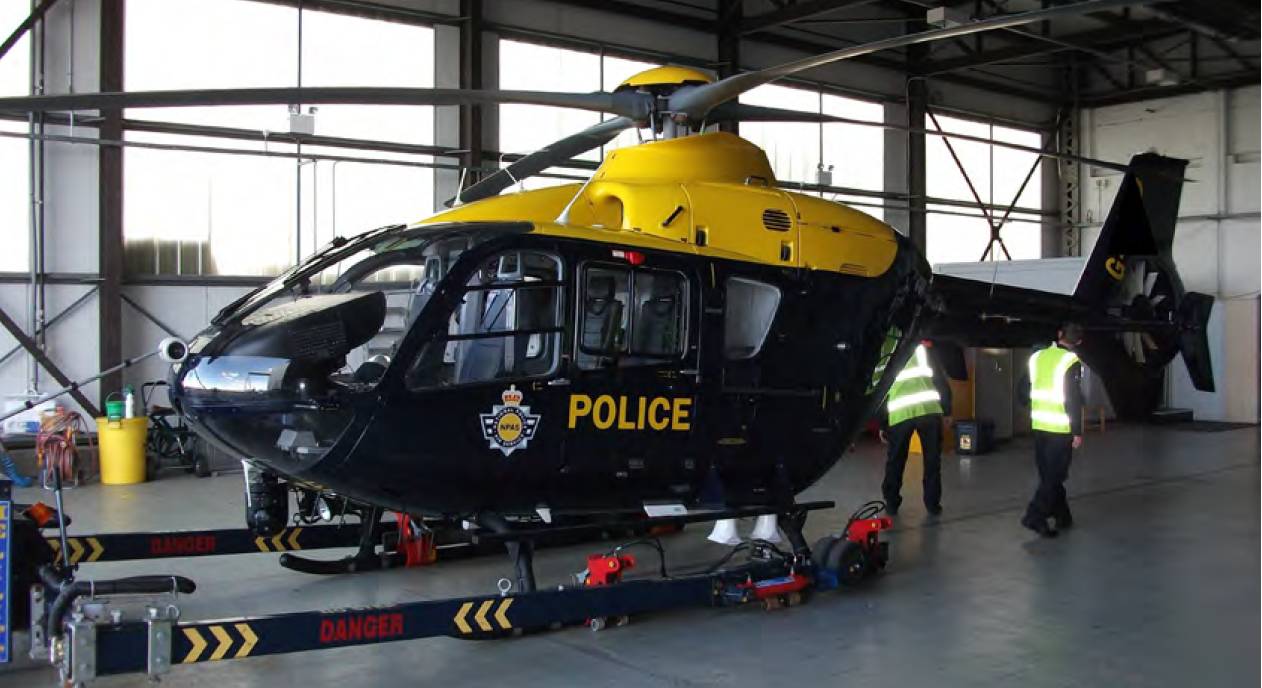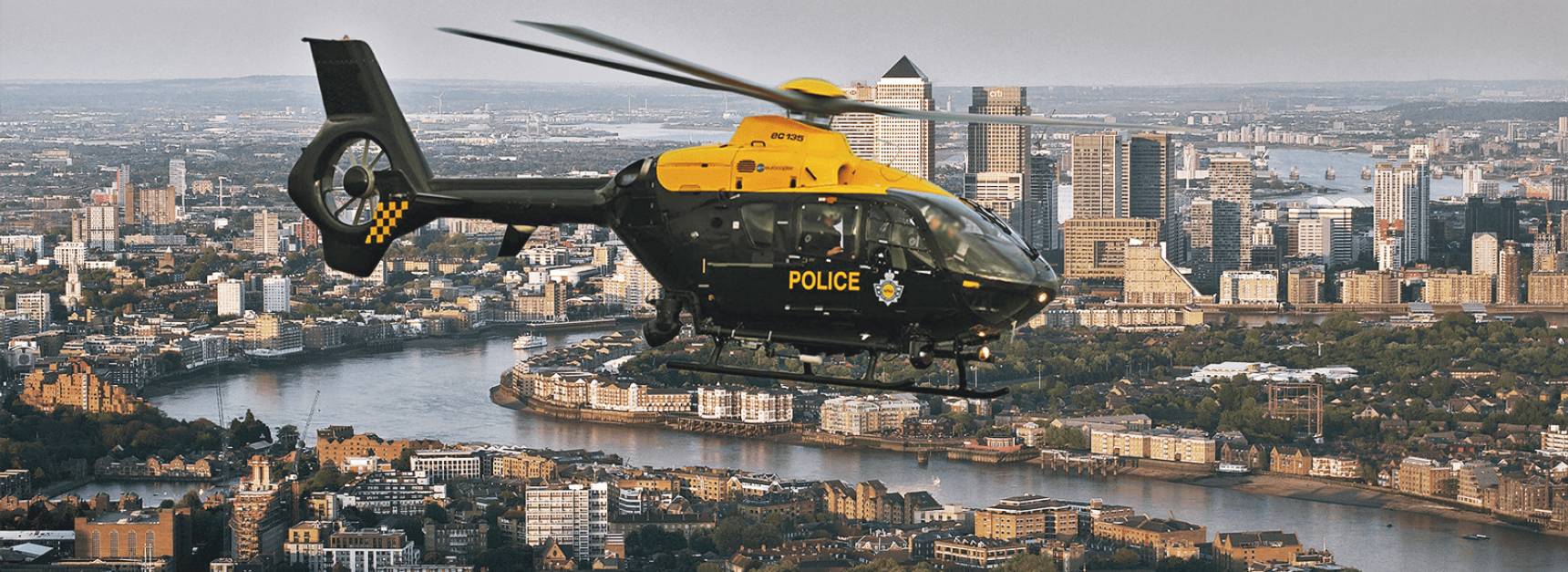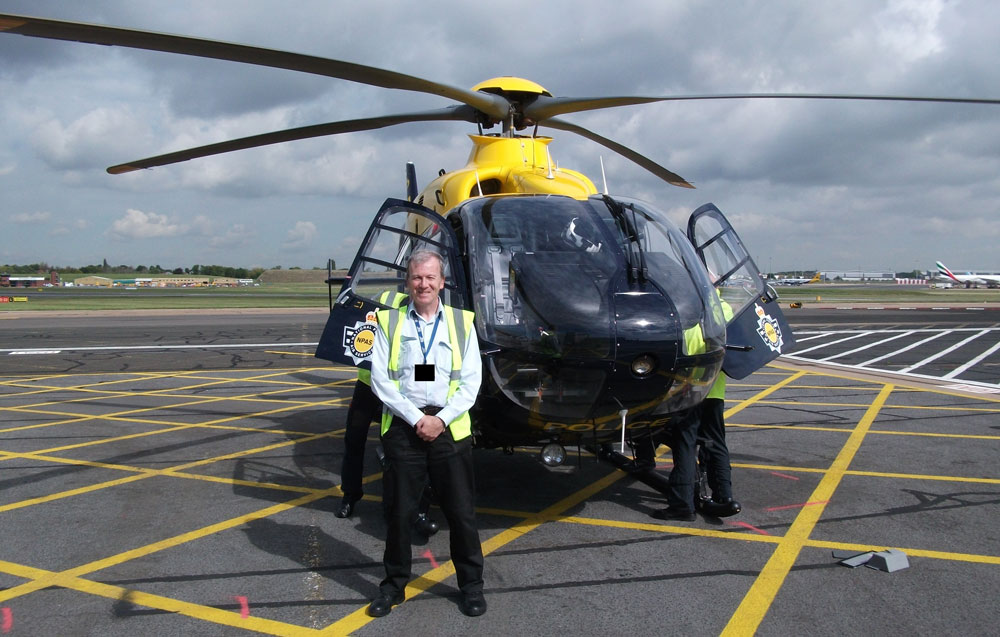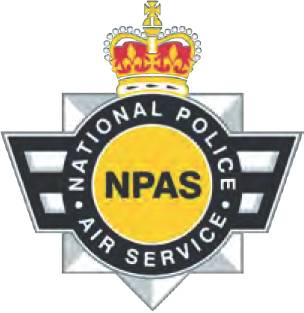The in vivo observations of operational sorties, ad hoc between-sortie unstructured interviews with pilots and TFOs, formal semi-structured interviews with pilots and TFOs and the interviews with staff at the NPAS control centre, produced the insights described below.
Resourcing has implications for teamwork, effectiveness and safety
ON A NIGHT SHIFT, I GO FROM SLEEPING SEVEN HOURS TO SLEEPING TWO …. DOING FOUR HOURS FLYING ON A SHIFT IS QUITE A LONG TIME. YOU GET BACK, YOU GET GASSED-UP. DO YOUR ADMIN. YOU END UP THROWING YOUR FOOD DOWN YOUR NECK …. THREE HOURS [FLYING] MAKES AN IMPACT ON YOU
Anonymous Tactical Flight Officer,
UK NPAS
Cuts in police budgets have affected how the NPAS operates. While most missions are undertaken by three crew, some are undertaken by two.
Given that pilots and TFOs are trained for three-up operations and that the aircraft’s systems are designed around three-up operations, the introduction of two-up operations has implications for teamwork, effectiveness and safety.
Teamwork, because it is more difficult to work effectively as a team when sitting in tandem. Effectiveness, because there are fewer crew members looking out.
Safety, because in a complex, high-tempo operation, such as a pursuit or firearms incident, a two-person crew is more likely to find itself task-saturated. Saturation causes coning of attention. Cues can be missed. Safety can be undermined.
Cultural differences between air support and regular policing
Air support has a distinctive culture. The air support culture, shaped by the principles of CRM, values independent thought, the questioning of authority and transparency. In air support it is normal for a person who errs to admit to a mistake. This supports organisational learning which improves margins of safety. It was claimed that in regular policing a person who errs is less likely to admit to a mistake. Lack of transparency inhibits organisational learning. The air support culture values the questioning of authority more than it does obedience. The regular policing culture values obedience more than it does the questioning of authority. It was claimed that these cultural differences create friction within the police service.
 Simon Bennett
Simon Bennett
Operations are suffused with stressors
Police helicopter operations are laced with stressors.
For example:
- dispatchers’ sometimes unrealistic expectations
- the knowledge that if a job is declined, civilian injuries or deaths might result
- pressure to launch quickly
- operating at low altitudes in marginal weather
- operating in difficult terrain
- aircraft vibration
- cabin noise
- in the summer, solar heating of the cabin
- pressure to turn the aircraft around quickly
- occasional periods of inactivity (usually caused by poor weather)
- irregular meals
- bolted meals
- disturbed sleep
- sleep-loss
Asked to reflect on operational stressors, one TFO observed: “After 02:00 I am quite grumpy. You are heading for the 04:00 trough …. It is dark, your body is in a different state. On a night shift, I go from sleeping seven hours to sleeping two …. Doing four hours flying on a shift is quite a long time. You get back, you get gassed-up. do your admin. You end up throwing your food down your neck …. Three hours [flying] makes an impact on you. My ears are ringing sometimes. The aircraft vibrates. It just tires you out. You might be bouncing around. Your eyes get quite strained”.
Frustrations and setbacks are met with circumspection
Jobs are, on occasion, turned down. The resulting frustrations are, however, met with circumspection. As a TFO put it: “You have got to be a bit stoic and say: ‘We’ll get them next time’ …. You kind of pacify yourself that way”. Tactical Flight Officers are required to balance two potentially conflicting cultures. As police officers, TFOs want to protect and serve. As flight crew, TFOs want to ensure they and their pilot colleagues make it to the end of the shift alive.
The team-working tool CRM provides practical support and psychological comfort in challenging situations
Crew resource management instills in pilots and TFOs the skills and confidence to organise and direct resources (hardware, software and liveware) to best effect. Everyone agreed that CRM made a positive contribution to flight safety and operational effectiveness. It was observed that CRM is especially useful in stressful, high-workload situations, such as when, in September 2014, a crew witnessed a beheading in the back garden of a house in Edmonton, north London. One of the TFOs who witnessed the beheading observed: “I had quite a horrific incident a couple of years ago …. a chap who turned out to have mental issues actually beheaded somebody on camera while we were watching. He held her head up to us. Threw it down the garden …. we were all almost leaning on CRM as a kind of a support …. There was a lot more chatter and interaction than there would have been without awareness of it [CRM]”.
Operational pressures leave little time for post-sortie adjustment
Time-critical, high-consequence jobs, such as searching for a person swept out to sea, or trying to help a person struggling to stay afloat in a fastflowing river, or directing officers to intercept a psychopath with a bladed weapon can leave crews stressed. Ideally, those who witness disturbing events should be allowed time for decompression and adjustment. While it was usual for crews that had witnessed acts of extreme violence, such as the Edmonton beheading, to be stood down, crews that had witnessed less violent, but, potentially, equally stressful incidents, could find themselves catapulted from one stressful job to the next with no time for decompression and adjustment.
CONTINUOUS EXPOSURE TO MULTIPLE STRESSORS CAN AFFECT MENTAL HEALTH AND PERFORMANCE. IN EXTREMIS, CONTINUOUS EXPOSURE TO MULTIPLE STRESSORS MAY INDUCE ACUTE STRESS DISORDER (ASD)
Continuous exposure to multiple stressors can affect mental health and performance. In extremis, continuous exposure to multiple stressors may induce acute stress disorder (ASD). Exposure to a violent event, such as a murder may induce post-traumatic stress disorder (PTSD). Writing in the book Nonkilling Psychology, Rachel MacNair notes that those with PTSD experience “… recurrent and intrusive distressing recollections of the [traumatic] event, including images, thoughts or perceptions”. They may act or feel “as if the traumatic event were recurring”.
Post-sortie debriefs are sometimes skipped Some interviewees claimed that post-sortie debriefs were sometimes skipped. One TFO observed: “Maybe debriefing should be compulsory. Maybe you should add it to the routine. It would only take five minutes”. When debriefs are skipped, experiential data is lost. Loss of experiential data inhibits organisational learning. Organisations that fail to exploit experiential data are less safe.
In the field of commercial aviation it has been demonstrated that the wider the catchment for CRM training, the safer and more efficient an airline’s operation. At the more innovative airlines, pilots, cabin crew, dispatchers, engineers and other ground staff are co-trained in CRM. The benefits of co-training include:
- the elimination of communication barriers
- creating among crew members a better understanding of roles and responsibilities
- the promotion of mutual respect
- the exposure of dysfunctional stereotypes (for example, the ‘trolley dolly’ cabin crew stereotype).
Pilots and TFOs claimed that expanding the catchment for CRM training to include dispatchers, managers and others would help deliver a more effective service. A pilot noted: “[Control room staff] are not hugely aviation-aware”. Asked who should be trained in CRM, a TFO observed: “The Wakefield dispatchers … regional managers, whether they come from a flying background or not”. He went on: “Senior people need to spend time with us. They need to understand the basics and the demands …. One time in a twelve-hour shift I did five hours and fifteen minutes flying. You might say ‘That’s not even half’.
You are absolutely knackered after four hours. It’s not like sitting on the flight deck at 35,000 feet on autopilot, monitoring”. A Base Commander-TFO observed: “I think (dispatchers) should be attached to a unit for a week or two to gain a better understanding of the working environment and the demands …. They need to see what happens in the aircraft and what happens on the ground between jobs. They need a better understanding of the paperwork side of downtime. They can sometimes be too quick to send you to another job. They need to understand that when you land … after that second job, you have twice as much paperwork to do …. They should see CRM practised at a unit level”.
 Airbus
Airbus
Spontaneous adaptations support safe and efficient operation
Spontaneous in-situ crew-initiated adaptations (work-arounds) support safe and efficient operation. This can be seen, for example, in the way pilots and TFOs distribute tasks to avoid task-saturation. As one pilot explained: “After you have done all your training, there are certain things that you don’t know. For example, there are six police and two air traffic channels to be monitored. In an ideal world, all crew would monitor all channels all of the time. You can’t do that. You’d max-out. I listen to the air traffic channel and turn down all the other channels. I ask the TFOs to tell me if they are given new operational orders or requests because I have turned those channels down. Then I can concentrate. Conversely, the TFOs want the tactical information. They turn the air traffic channels down and turn the other channels up …. Nobody ever teaches you that. It’s not a SOP. That’s pure experience that tells me that’s the best way to do it”. Spontaneous adaptations, such as the division of labour vis-à-vis radio communication evidence a facility for independent thinking and innovation – safety-enhancing skills trained in the better CRM courses.
Ensuring force officers had a better understanding of air support would improve the effectiveness
The view was put that force officers require a better understanding of the NPAS tactical air support offering. This would help avoid situations where air support was asked to do too much, or, indeed, too little.
One interviewee claimed that force officers receive no formal training in teamwork. Force officers would benefit from CRM training tailored to the needs of regular policing.
Conclusions
The in vivo and interview-based research produced several findings, viz:
- that the NPAS achieves much on an inadequate budget
- that pilots and TFOs are able, through creative thinking, to develop effective work-arounds
- that the NPAS could do more with larger, more capable helicopters, equipped with better, more reliable sensors and communications
- that two-up operations carry more latent errors (accidents waiting to happen) than three-up operations
- that widening the constituency for CRM training and ensuring that force officers understand the NPAS tactical air support offering would improve operational safety and efficiency
- that CRM makes an invaluable contribution to operational safety and efficiency. CRM was universally praised
- that the co-training of pilots and TFOs in CRM improves teamwork and resilience and, therefore, operational safety and efficiency.
 Simon Bennett
Simon Bennett In 2017, I was asked to assess the quality of flight deck human factors at the NPAS. I produced a report for the NPAS and wrote two academic papers and a book chapter. The mixed-methods study saw me observe operational sorties and conduct semistructured interviews with pilots and TFOs at bases in England and Wales.
In 2017, I was asked to assess the quality of flight deck human factors at the NPAS. I produced a report for the NPAS and wrote two academic papers and a book chapter. The mixed-methods study saw me observe operational sorties and conduct semistructured interviews with pilots and TFOs at bases in England and Wales.
